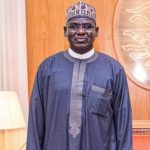The Nigerian Communications Commission (NCC) is irrevocably committed to the implementation of various regulatory initiatives and programmes, in collaboration with all stakeholders in the telecom ecosystem, towards bridging identified gaps and shortages in critical telecom infrastructure in the country.
The Executive Vice Chairman and Chief Executive Officer (EVC/CEO) of NCC, Prof. Umar Garba Danbatta, stated this at an in-house forum which took place at the Commission’s Head Office in Abuja recently.
He said the overarching objective is to fulfil the Commission’s mandate and support extant and emergent policies and strategies of the Federal Government that are focused on providing, accessible and affordable broadband services in Nigeria.
The EVC emphasized the significance of infrastructure to telecom service provision adding that availability of broadband in sufficiency was non-negotiable and in the nation’s strategy towards delivering telecom services.
Prof. Danbatta said Government is putting in much effort towards addressing infrastructure gaps. He commended both state and non-state actors for the vision, diligence and continued dedication to the implementation of the NCC driven Nigerian National Broadband Plan (NNBP) 2020-2025, conceived to address infrastructure gaps in the telecom and ICT sectoran initiative of the Federal Government.
He expressed appreciation that the new plan particularly took into consideration, the identified gaps and challenges in the National Broadband Plan 2013-2018, which the NCC was equally central to it’s implementation.
According to Danbatta, inadequate infrastructure remains a bane to achieving desired broadband penetration to boost access to services that will enhance economic growth and development.
“The Commission recognises the importance of infrastructure expansion and this explains its unequivocal commitment and desire to see the licensed Infrastructure Companies (InfraCos) work speedily and with precision to cascade fibre to the hinterland, in order to enhance robust telecom service provision”. He said.
The EVC noted that Commission’s target for licensing the infraCos was to ensure the deployment of fibre infrastructure needed for pervasive broadband penetration across the 774 local government areas (LGAs). This, he said, will ensure access to telecoms services in the hinterlands of the country, and by so doing address the challenges of access confronting the unserved and underserved areas of the country.
Danbatta also placed on record Commission’s desire for inclusiveness as seminal to erecting sustainable telecom architecture. This, according to him is critical in ensuring the achievement of Federal Government’s target on digital access and financial inclusion.
In his words: “One visible area of beneficial financial service riding on telecom infrastructure is the provision of Unstructured Supplementary Service Data (USSD) for financial transactions across various financial institutions’ platforms.
“This feat has brought ease to financial transactions, even as NCC is providing support for e-payment initiatives and policies of the Central Bank of Nigeria (CBN), including the e-Naira project, which is the digital currency issued and regulated by the apex bank.
“So, the Commission is committed to inclusiveness by ensuring the provision of affordable and pervasive accessibility to the Internet as emphasised by the International Telecommunication Union (ITU) and the United Nations (UN). We are aware that until commensurate infrastructure is deployed in the country, the country may not hit the required target necessary for the desired economic development,” the EVC added.








Comment here